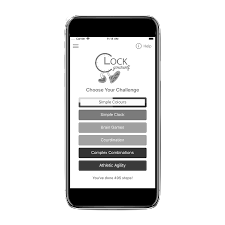An app is a small piece of software running inside an operating system that allows you to perform a specific task. Apps emerged from early Personal Digital Assistants (PDAs), through the addictively simple game Snake on the Nokia 6110 phone, to the first 500 apps in the Apple App Store that made their debuts in July 2008.
Clock Yourself is a fun, low-tech and low-cost exercise app that employs cognitive-motor dual tasking principles, and was the first exergame app purpose built by a physiotherapist. The inspiration for Clock Yourself came from an exercise commonly prescribed by physiotherapists for weight shift practise, whereby a patient imagines themselves at the centre of a clock on the floor and takes a large step in the direction of one of the clock-face numbers and back again.
To automate the number prompts for a stepping strategy station in her balance class, Australian physiotherapist Meg Lowry recorded herself reading a string of random numbers, paced by a metronome. When her patients requested the recordings for practise at home, she engaged a software engineer friend to build an app, and invited her balance class patients to collaborate on the app design. Together they brainstormed options to further gamify the exercises, such as replacing the numbers with colours, foreign words, and abstract symbols to be memorised.
The Clock Yourself app was launched in 2017 at the World Confederation for Physical Therapists conference in Cape Town. Although it was initially designed for the older adult and neurological rehab populations, physiotherapists from all around the world recognised its versatility and adapted it for use a variety of populations from paediatrics to elite sports athletes. Clock Yourself has been downloaded more than 75,000 times in over 30 countries worldwide.
Description provided by Meg Lowry of Australia

